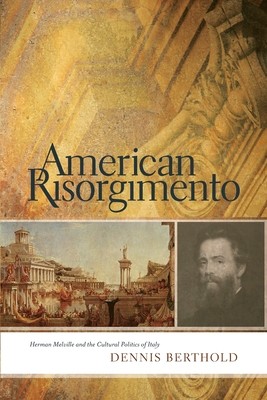
- We will send in 10–14 business days.
- Author: Dennis Berthold
- Publisher: Ohio State University Press
- ISBN-10: 0814257062
- ISBN-13: 9780814257067
- Format: 15.2 x 22.9 x 1.8 cm, softcover
- Language: English
- SAVE -10% with code: EXTRA
Reviews
Description
Although Herman Melville is typically considered one of America's earliest cosmopolitan writers, scholarship has focused primarily on his involvement with the South Seas, England, and the Holy Land. In American Risorgimento: Herman Melville and the Cultural Politics of Italy, Dennis Berthold extends Melville's transnational vision both geographically and historically by examining his many references to Italy and Rome in the context of the Risorgimento, Italy's long quest for independence and political unity. Melville's contemporaries, notably Margaret Fuller and Henry T. Tuckerman, recognized the similarities between the Risorgimento and America's struggle for national identity, and the influx of exiles from the failed Italian revolutions of 1820 and 1831 made Melville's New York a hotbed of Risorgimento sympathies. Literary and political expostulations on Italy's plight combined to create a distinctively American view of the Risorgimento that Melville elaborated in his fiction through allusions, characterizations, and direct commentary on Roman history, Dante, Machiavelli, Pope Pius IX, and Giuseppe Mazzini. Melville followed the unfolding drama of Italian nationalism more closely than any other major American writer and found in it tropes and themes that fueled his turn to poetry, particularly after his visit to Italy in 1857. The Civil War, a crisis for American nationalism as urgent and profound as the Risorgimento, reinforced the symbolic parallels between the United States and Italy and led Melville to meditate on Giuseppe Garibaldi and other Italian patriots in one of his longest poems. Melville's literary appropriations of Italian history, art, and politics demonstrate that transnational cultural exchanges are not confined to later American writing but originate with the country's earliest authors and their recognition that any national literature worthy of the name must incorporate a broad international frame of reference. Dennis Berthold is professor of English at Texas A&M University, College Station.
EXTRA 10 % discount with code: EXTRA
The promotion ends in 20d.08:41:49
The discount code is valid when purchasing from 10 €. Discounts do not stack.
- Author: Dennis Berthold
- Publisher: Ohio State University Press
- ISBN-10: 0814257062
- ISBN-13: 9780814257067
- Format: 15.2 x 22.9 x 1.8 cm, softcover
- Language: English English
Although Herman Melville is typically considered one of America's earliest cosmopolitan writers, scholarship has focused primarily on his involvement with the South Seas, England, and the Holy Land. In American Risorgimento: Herman Melville and the Cultural Politics of Italy, Dennis Berthold extends Melville's transnational vision both geographically and historically by examining his many references to Italy and Rome in the context of the Risorgimento, Italy's long quest for independence and political unity. Melville's contemporaries, notably Margaret Fuller and Henry T. Tuckerman, recognized the similarities between the Risorgimento and America's struggle for national identity, and the influx of exiles from the failed Italian revolutions of 1820 and 1831 made Melville's New York a hotbed of Risorgimento sympathies. Literary and political expostulations on Italy's plight combined to create a distinctively American view of the Risorgimento that Melville elaborated in his fiction through allusions, characterizations, and direct commentary on Roman history, Dante, Machiavelli, Pope Pius IX, and Giuseppe Mazzini. Melville followed the unfolding drama of Italian nationalism more closely than any other major American writer and found in it tropes and themes that fueled his turn to poetry, particularly after his visit to Italy in 1857. The Civil War, a crisis for American nationalism as urgent and profound as the Risorgimento, reinforced the symbolic parallels between the United States and Italy and led Melville to meditate on Giuseppe Garibaldi and other Italian patriots in one of his longest poems. Melville's literary appropriations of Italian history, art, and politics demonstrate that transnational cultural exchanges are not confined to later American writing but originate with the country's earliest authors and their recognition that any national literature worthy of the name must incorporate a broad international frame of reference. Dennis Berthold is professor of English at Texas A&M University, College Station.


Reviews